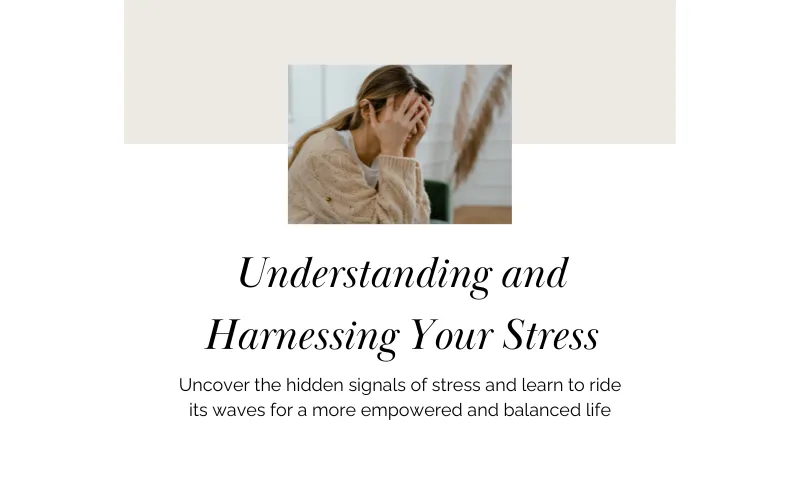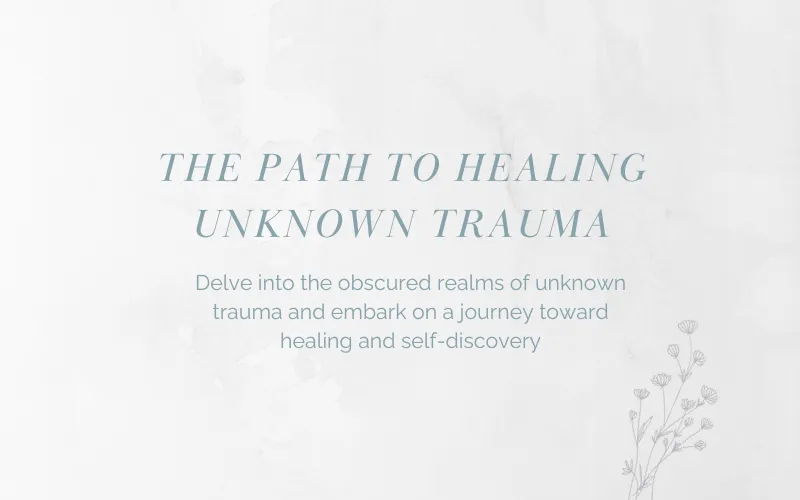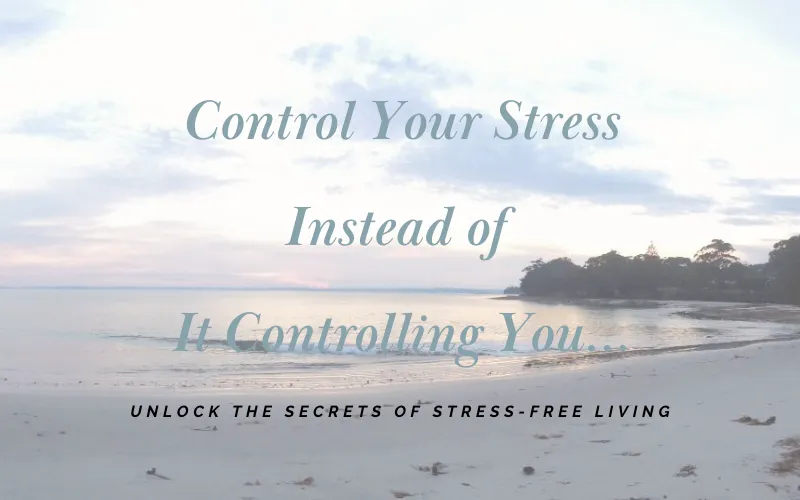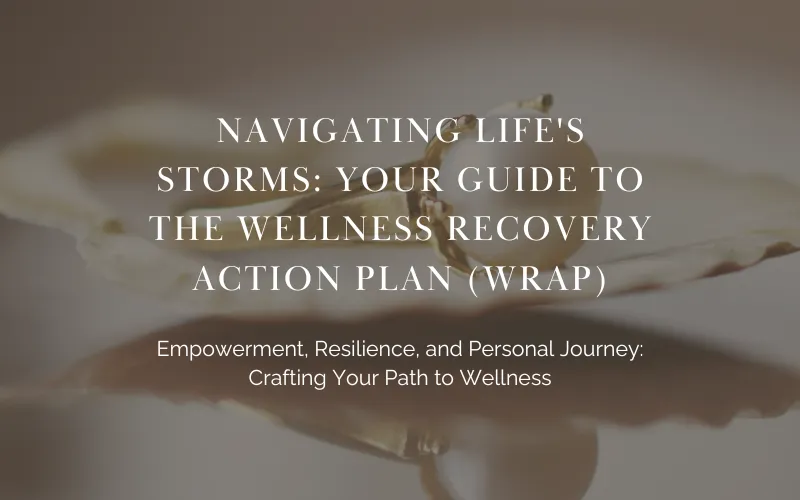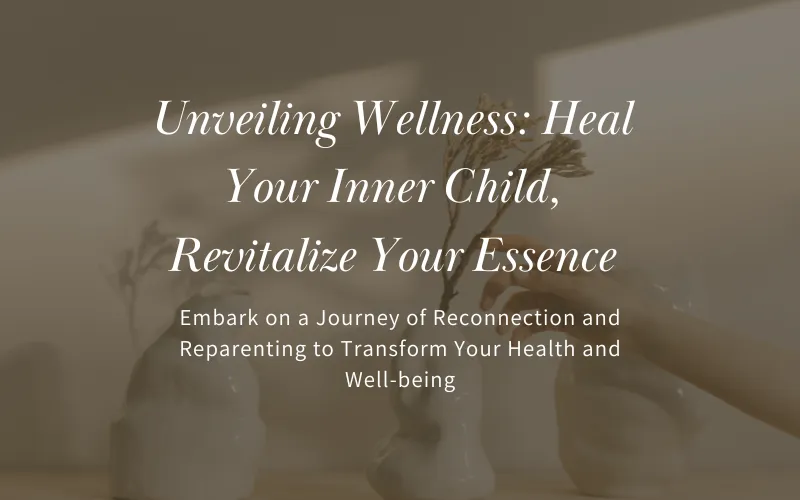Navigating the Path to Wellness: Understanding and Implementing Your WRAP

The Importance of Mental Health Recovery and the Wellness Recovery Action Plan (WRAP)
Mental health recovery is crucial for individuals seeking overall wellness. It involves regaining control over one's life, managing symptoms, and improving overall well-being. However, the journey towards mental health recovery can be challenging and complex. This is where the Wellness Recovery Action Plan (WRAP) comes into play.
The WRAP is a valuable tool designed to support individuals in their mental health recovery journey. It provides a structured framework for developing personalized strategies to manage symptoms, prevent relapses, and promote overall wellness. By implementing a WRAP, individuals gain a sense of empowerment and ownership over their mental health.
In this blog post, we will explore the significance of mental health recovery and delve into the details of implementing your own WRAP. By understanding the importance of mental health recovery and utilizing the WRAP as a guide, readers will be equipped with the necessary tools to navigate their path to wellness.
Implementing Your WRAP: Coping Strategies and Wellness Tools
Understanding the WRAP Process
The WRAP process is a structured approach that involves identifying triggers, early warning signs, and crisis plans. By recognizing these factors, individuals can develop coping strategies and wellness tools to manage their mental health effectively. Creating a WRAP requires self-reflection and understanding personal needs and preferences.
Coping Strategies for Mental Health
Implementing coping strategies is essential for maintaining mental well-being. Some effective coping strategies include practicing self-care, engaging in physical activity, and seeking support from loved ones. Self-care activities such as taking breaks, engaging in hobbies, or practicing relaxation techniques can help reduce stress levels. Additionally, using relaxation techniques like deep breathing exercises, meditation, and mindfulness can promote calmness and emotional stability. Exploring creative outlets like art therapy, journaling, or listening to music can also serve as healthy coping mechanisms.
Wellness Tools for Mental Health
Incorporating wellness tools into daily life can significantly contribute to mental health recovery. Utilizing tools like mood trackers allows individuals to monitor their emotional state and identify patterns or triggers. Gratitude journals help cultivate a positive mindset by focusing on the things one is grateful for each day. Goal-setting techniques provide structure and motivation towards achieving personal milestones. It's also important to incorporate healthy habits such as maintaining a balanced diet, getting enough sleep, and practicing good hygiene as they directly impact overall well-being. Engaging in activities that promote mental well-being such as practicing mindfulness, engaging in hobbies, or spending time in nature can also be beneficial.
By implementing coping strategies and utilizing wellness tools tailored to individual needs, individuals can effectively navigate their path to wellness through their WRAP.
Creating a Comprehensive Mental Health Plan
The Significance of a Comprehensive Mental Health Plan
A comprehensive mental health plan plays a crucial role in taking control of one's mental well-being. It goes beyond just managing symptoms and focuses on strategies for managing stress, building resilience, and preventing relapses. By creating a comprehensive plan, individuals can establish a roadmap for their mental health recovery journey.
Creating a plan involves setting realistic goals that are specific, measurable, achievable, relevant, and time-bound (SMART). These goals provide direction and motivation to work towards positive outcomes. Additionally, identifying support systems is essential. This includes reaching out to trusted individuals who can provide emotional support and understanding. Joining support groups or seeking therapy can also be beneficial as it allows individuals to connect with others who share similar experiences and learn from their insights.
Seeking professional help is another important aspect of creating a comprehensive mental health plan. Recognizing the importance of professional guidance demonstrates strength and a proactive approach towards wellness. Consulting with mental health professionals allows individuals to receive personalized treatment plans tailored to their specific needs. Therapy sessions provide a safe space to explore emotions, develop coping strategies, and gain valuable insights into one's mental health.
By incorporating these elements into their comprehensive mental health plan, individuals can take significant steps towards achieving overall wellness and maintaining long-term mental well-being. Remember that creating a plan is an ongoing process that may require adjustments along the way as personal circumstances change.
Embarking on Your Journey Towards Wellness
Implementing a WRAP and creating a comprehensive mental health plan are essential steps towards mental health recovery. By utilizing coping strategies, wellness tools, and building a support network, individuals can navigate their path to wellness with confidence and resilience. It's important to remember that mental health recovery is a journey, and it may have its ups and downs. Seeking professional help is always an option and should never be seen as a sign of weakness.
Remember to be patient with yourself, practice self-compassion, and celebrate even the smallest victories along the way. With dedication and support, you can embark on your journey towards wellness and experience the positive transformation it brings.
Take Charge of Your Journey: Join Our Free Group & Download Your WRAP Guide!
The path to mental health recovery is both personal and transformative, and the Wellness Recovery Action Plan (WRAP) is your companion in this journey. Are you ready to take charge of your wellness? To dive deeper and connect with peers who are on the same path? Join our exclusive, free group today! Share your experiences, gain insights, and find the support you need to implement your WRAP successfully.
But that's not all — we're committed to empowering you on this journey, which is why we're offering a comprehensive WRAP guide in a downloadable PDF format. This guide is designed to help you understand and create your own WRAP, giving you a practical tool to navigate the complexities of mental health recovery.
Don't wait any longer; take the first step toward self-empowerment today. Click below to join our community and download your WRAP guide. Your journey to wellness starts now!
Download Your WRAP Guide (PDF) — Your blueprint to wellness.
Download 200 Self-Care Ideas - Your guide to wellness has never
Join Our Free Group — Connect, share, and grow with us.
References:
- Copeland, M.E. (2002). Wellness Recovery Action Plan. Dummerston, VT: Peach Press. WRAP Info.
- Cook, J.A., Copeland, M.E., Jonikas, J.A., Hamilton, M.M., Razzano, L.A., Grey, D.D., Floyd, C.B., Hudson, W.B., Macfarlane, R.T., Carter, T.M., & Boyd, S. (2012). Results of a randomized controlled trial of mental illness self-management using Wellness Recovery Action Planning. Schizophrenia Bulletin, 38(4), 881-891. Retrieved from Oxford Academic.
- Substance Abuse and Mental Health Services Administration (SAMHSA). (2013). Wellness Recovery Action Plan (WRAP) for Addictions. Retrieved from SAMHSA.
- WRAP and Recovery Books. (2014). WRAP for Veterans and People in the Military. Retrieved from WRAP and Recovery Books.
- Mental Health Recovery. (n.d.). WRAP Is... Retrieved from Mental Health Recovery.


